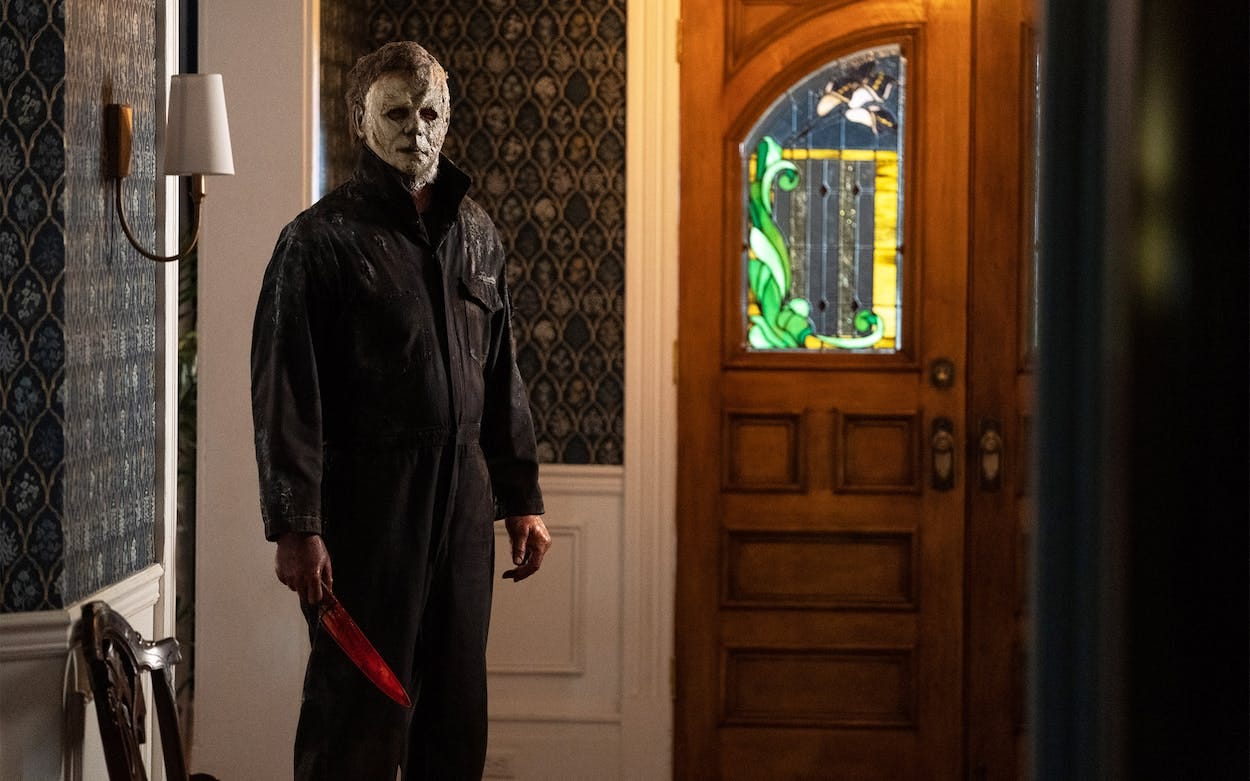Halloween Ends Not With a Scream But With a Pratfall
The most disappointing movie of 2022.
Rating 3.5/10
John Carpenter’s original classic 1978 Halloween was brilliant because of its simplicity. A maniac, the masked Michael Meyers, escapes from a sanitarium and starts killing people. Then he keeps killing people. Then he kills more people, until our heroine, Laurie Strode (Jamie Lee Curtis), kills him. The end.
That’s it. That is the whole concept. Bad guy kills people; bad guy is killed. How can you mess it up?
Halloween Ends, purportedly the last film in the 40-year-long franchise, is about finding complicated ways to fail at this simple, elegant, beloved formula. That’s somewhat amusing at first. But by the end of the 111 minute run-time, the movie’s ponderous refusal to deliver has become thoroughly annoying, not to mention baffling. Why heap on all these complications and morals and mythology? For pity’s sake, just get out of Michael’s way.
You’re No Michael, Corey
The movie won’t get out of Michael’s way. Instead, it throws in not one, but two stories that are supposed to be about Michael, but are instead an excuse to spend run time on something other than Michael killing people (which is, again, the only thing people show up for these movies to see.)
The first story is a continuation of the narrative from the last Halloween film, Halloween Kills (2021). In that movie, Michael returned yet again to torment the aging Laurie Strode; she drove him off, but only after the death of her adult daughter. Halloween Ends is set four years later, as Laurie focuses on healing and writing her memoirs and flirting just a little with Officer Hawkins (Will Patton). But she is still haunted, etc. , you know the drill. Jamie Lee Curtis gives the part of tough, foul-mouthed grandma all she’s got, but the writers don’t give her much to work with.
The second story is completely new to the series—though hardly to movies as such (it’s very reminiscent of Carpenter’s Christine, as just one example).
Corey Cunningham (Rohan Campbell) is a nerdy engineering geek. After a terrible accident, in which he accidentally harms someone, he becomes a target of town bullies. When he starts to fight back, he discovers an inner darkness. Will it consume him?
The bridge between these two narratives is Allyson (Andi Matichak), Laurie’s granddaughter. Laurie lives with her grandmother and works as a medical assistant at a local doctor’s office. She also falls for Corey, and the two live dangerously on the edge by going to costume parties and riding motorcycles. In classic soapy melodrama style, she’s torn between the good grandmother and the bad boy, who struggle for her soul.
Where’s Michael?
Michael wanders around the edge of these narratives less like a dark shadow, and more like an afterthought. Laurie spends a lot of time musing on the true meaning of Michael in a ponderous voice-over: is he the antagonist threatening the tribe? A corruption within? Etc., you know the drill.
Corey, meanwhile, stumbles upon Michael, either in the flesh or as a symbol of his own moral deterioration. Michael may possess him, or take him as an apprentice, or maybe just show up on screen with him because it’s supposed to be his movie.
As the overly complicated and often openly nonsensical plot wanders down highways and into pointless tunnels, both Laurie and Corey end up taking up Michael’s knife and standing in Michael’s heavy shoes. If you were extremely generous, you could read this as a metaphor; Michael is a kind of potential which tempts all of use, and we could all be the face behind the mask.
The movie plays these moments as twists or ironic reversals though. It comes across less as a comment on evil, and more as the plot desperately spinning its spiked wheels, trying to get that Michael-murder feeling without actually having Michael do much murdering. Is the problem that we all can be Michael? Or is the problem that you keep trying to get other people to be Michael, and they’re not Michael, and the whole thing just seems like clumsy foolishness?
Too Little Michael, Too Late
To be fair, the last thirty minutes or so of the film do involve the kind of Michael rampaging you’d expect from the entire movie.
But even here, the vibes are off. Michael doesn’t just kill at random, mowing down everyone in his path. Instead, he seeks out specifically people who have irritated or bothered Corey.
The narrative isn’t about a faceless force that wields a scythe indiscriminately. It’s a revenge picture, where transgressors against Corey are punished, more-or-less righteously. It makes you wonder why Michael cares about Corey, or whether Michael is supposed to be Corey’s other self, somehow.
Which might be okay if Corey were in any way interesting, which he unfortunately is not. Director David Gordon Green is fascinated with him, apparently. But he doesn’t manage to explain or convey that fascination to the audience.
And then, at the very end of the film, Green seems to lose interest himself, and shifts back to Michael, for a big, symbolic conclusion to the series. But you can’t give a character much gravitas when you’re spent 85 odd minutes demonstrating that you don’t care about that character in the first place.
I’m sure that, despite the title, there will be more Halloween movies to come. Michael’s hard to kill. But if you can’t stab him or shred him or shoot him to death, Halloween End shows that you can complicate him into irrelevance.
First published October 2022.


